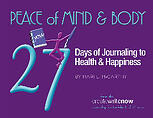Guest Blog Post by Walter Chen

During college I thought it would be a good idea to keep a journal, but all of my journals since have followed the same pattern: periods of frequent updates punctuated by long absences. What I realized was that, for the life of me, I couldn’t force a new habit onto myself. On the one hand I wanted to get myself to write a journal entry every day. On the other hand, attempting to make it a part of my routine with the hope that it would eventually become automatic wouldn’t work—I would never get past step one.
What ultimately worked was a combination of short form journal entries prompted by e-mail. I built a simple system that emailed me on a daily basis to ask what I did. All I had to do was respond to the email. The system would take my entry and put it in a calendar, and then give me a check mark for the day.
Responding to a daily e-mail with a list of what I did that day was easy enough. Three months in and I still don’t conceive of my daily life-logging as a routine or a habit—it’s just another e-mail I respond to every day. Rather than lengthy reflections, my daily responses are short snippets of what I’ve done that day or how I was feeling. If I had to write long-form reflections, I knew I would never keep it up. There’s also the mental anguish of wanting to make your entries just right. Forcing myself to write long-form entries would have turned a quick response e-mail into a painful chore that I would have inevitably put off, probably indefinitely.
Traditional journal entries are a means of real-time reflection. Short-form journal entries serve a different purpose—they create a simple record that you can reflect on later. My father told me that the easiest way to write a memoir was not to write down every single thought you have, but to write a few things that happened to you, and let that trigger the whole avalanche of thoughts and emotions that come from being transported back to that time and place.
Short-form journaling makes it easy for you to periodically look back on the last few weeks, scan through your entries and take stock of what you’ve been doing. It can also help you remember the last time you got your oil changed.
Bio
Walter Chen is the founder of iDoneThis, a free email-based short-form journal. We email you every day and ask, "What'd you get done today?" Just reply. Your entries go into a calendar for you to keep and reflect on. He built his personal tool out as a website when he saw how it positively affected his life.
~~~~~~~~~~~~~~~~~~~~~~~~~~~~~~~~

Have you signed up for the PMB 27 Days Journaling Challenge? It starts September 6!

Leave Comment